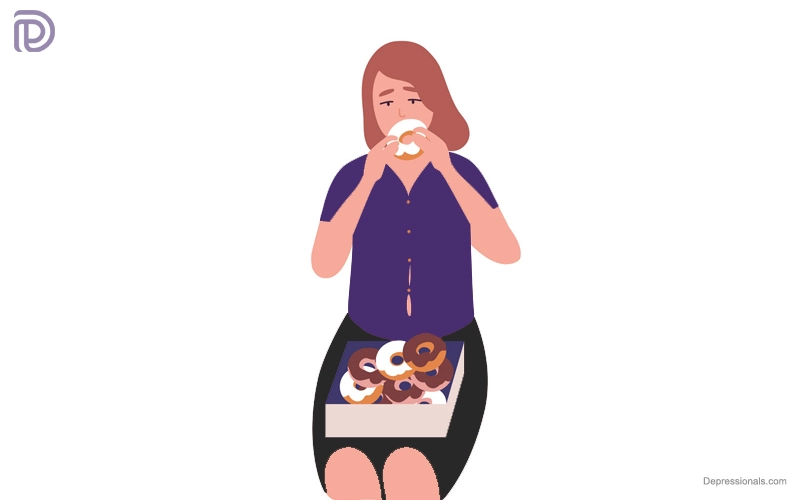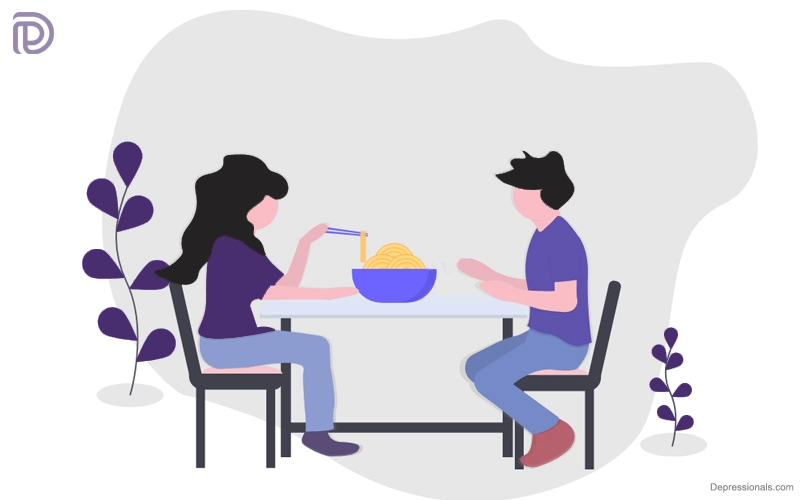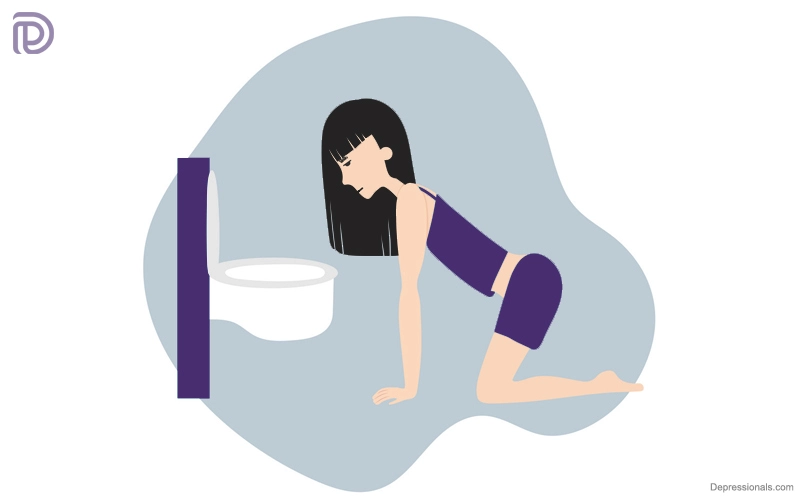This blog is a guide to stop binge eating. The United States has the highest incidence of feeding and eating disorders, including binge eating disorder (BED). BEDS is not just about food; it’s also a psychological condition. A medical professional will likely design a treatment plan for people with the disorder.
BED causes a person to eat excessive amounts even when they aren’t hungry. Often, they feel guilty or ashamed after an episode. Weight gain can result from frequent binge episodes, contributing to health conditions such as diabetes and heart disease.
It isn’t impossible to stop binge eating – both at home and with the help of a professional – because there are many strategies you can use.
Check all: Psychological Disorders
15 tips to stop binge eating.
1. Stop dieting
It has been shown that overly restrictive eating methods can result in binge eating episodes, so be aware of fad diets. A study published in the Journal of Adolescent Health found that fasting was associated with an increased risk of binge eating among 496 adolescent girls.
Similarly, 103 women in another study showed increased cravings for certain foods and an increased risk of overeating when abstaining from such foods. Diets that restrict food groups or drastically reduce calorie intake to lose weight rapidly should be avoided in favor of diets that promote healthy changes.
Make sure you eat a range of whole, unprocessed foods, like fruits, vegetables, and whole grains, and make sure you limit the number of treats you eat. Eating more whole foods can help you stay healthy and prevent binge eating.
There is some evidence that fasting can help you lose weight. It is possible to lose weight when you eliminate certain food items from your diet. You will no longer crave or overeat certain foods. Make healthy eating a priority instead of dieting or avoiding certain foods completely.
2. Don’t skip meals
One of the most effective ways to stop binge eating is to stick to a regular eating schedule. Overeating can result from skipping meals and can trigger cravings.
An observational study measured blood sugar levels and the hunger-stimulating hormone ghrelin levels after eating three large meals per day versus one large meal per day.
According to yet another study, people who ate regularly were less likely to binge eat. Make sure that you eat regularly and stick to your schedule.
Maintaining a regular eating schedule may help to reduce overeating and lower fasting blood sugar and ghrelin levels.
Read: Pica in Pregnancy
3. Practice mindfulness
Mindfulness involves paying attention to your feelings in the present moment and listening to your body. It teaches the person when they are no longer hungry, thereby helping to prevent overeating.
Practicing mindfulness meditation has been found to stop binge eating and emotional eating, according to a review of 14 studies. Another study found mindfulness combined with cognitive behavioral therapy helped people improve their eating habits and self-awareness.
Become aware of your body’s hunger signals and when they begin to diminish. You can also promote healthy eating behaviors by eating slowly and enjoying food.
When you use mindfulness to identify when you are no longer hungry, you will be better able to control your eating behaviors and stop binge eating.
4. Drink plenty of water
The best way to curb cravings and stop overeating is to drink plenty of water throughout the day. The studies show that consuming more water can lead to a decrease in hunger and calorie intake.
A study among 24 older adults indicated that drinking 17 ounces of water before eating a meal helped them consume fewer calories by 13% compared to a control group.
According to another study, drinking 13 to 17 ounces of water before eating significantly reduced hunger and calorie intake, while increasing feelings of fullness throughout the day.
Drinking more water may improve metabolic processes and help you lose weight. How much water you should drink each day depends on several factors. So, drink when you feel thirsty to stay well-hydrated and listen to your body.
You can reduce your calorie intake by drinking more water to prevent binge eating and keep you feeling full.
Read: Avoidant Restrictive Food Intake Disorder
5. Try yoga
Yoga is a form of exercise that uses breathing exercises, postures, and meditation to reduce stress and promote relaxation by incorporating both the body and mind.
Research suggests that yoga promotes healthy eating habits and helps reduce emotional eating. Practicing yoga for 12 weeks significantly reduced binging in 50 people with BED.
In another study, yoga combined with outpatient eating disorder treatment enhanced success rates in decreasing depression, anxiety, and body image disturbances – all factors that may contribute to emotional eating.
Studies have shown that yoga decreases levels of stress hormones like cortisol, which can keep stress under control and keep binge eating in check.
Add yoga to your routine by joining a local studio. Online videos and resources are also available for you to practice at home. Yoga may help to stop binge eating and reduce stress, anxiety and depression.
6. Increase your fiber intake
Your digestive tract moves fiber slowly through it, so you feel full for a longer period of time. Research suggests that consuming more fiber could reduce cravings, appetite and food intake.
Two-week studies found that consuming two servings of dietary fiber in vegetables twice daily decreased hunger and calories consumed and increased fullness.
The study of 10 adults found that taking 16 grams of prebiotic fiber daily caused the level of specific hormones influencing satiety to increase and hunger felt to be significantly reduced.
You can feel full after eating fiber-rich foods such as fruits, vegetables, legumes and whole grains. Fiber can help keep you feeling full to reduce calorie intake and feelings of hunger.
Read: Purging Disorder
7. Clean your kitchen
If you keep junk food and trigger foods around the house, it can be easier to binge eat. By limiting your access to unhealthy foods, you also reduce your risk of emotional eating.
Make healthier food choices by removing processed snacks like chips, candies, and convenience foods from your diet.
When you stock your pantry with fruits, vegetables, proteins, whole grains, nuts, and seeds, you will reduce your risk of binge eating unhealthy foods.
The removal of unhealthy foods from your kitchen and the addition of healthy alternatives to them can improve your diet and make binge eating more difficult.
8. Go to the gym regularly
A study indicates that exercise can help you to stop binge eating.
An experiment conducted in 77 people over six months found that increasing weekly exercise frequency reduced binge eating in 81% of participants.
According to another study involving 84 women, exercising regularly along with cognitive behavioral therapy was significantly more effective than therapy alone at reducing binge eating frequency.
Moreover, studies have shown that exercise can help prevent emotional eating by reducing stress levels and improving mood.
A variety of physical activities can reduce stress and reduce binge eating, including walking, running, swimming, biking and playing sports. Exercising has been found to reduce stress levels and binge eating risk.
Related: How to Stop Late Night Eating
9. Eat breakfast every day
If you get a healthy breakfast every morning, you might be less likely to indulge in binge eating later in the day.
According to numerous studies, people who maintain a regular diet are less likely to binge eat and have a lower level of ghrelin, which stimulates hunger.
You will also feel fuller for longer and reduce hunger by eating the right foods. One study in 15 people found that protein-rich breakfasts reduced ghrelin levels much more than carb-rich breakfasts.
Another study conducted on 48 adults found that eating fiber- and protein-rich oatmeal improved appetite control and promoted fullness. You can avoid overeating by pairing fiber-rich foods with a good source of protein, such as fruits, vegetables, or whole grains.
Consuming a fiber- and protein-rich breakfast can help keep hunger at bay throughout the day.
10. Get enough sleep
A lack of sleep may lead to binge eating since it affects appetite and hunger levels.
A study of 146 people found that those who have BED were more likely to suffer from insomnia than people who have not experienced this condition.
A study in another large institution showed that the hunger hormone ghrelin and the fullness hormone leptin were linked to shorter sleep duration.
The number of hours slept per night was associated with higher body weight as well. Keep your appetite in check and reduce the chance of binge eating by getting at least 8 hours of sleep every night.
Insomnia may worsen BED symptoms. Studies have shown that sleep deprivation alters levels of hormones that influence appetite and hunger.
Read: Pica Disorder
11. Record your mood and food intake
Tracking what you eat and how you feel with a food and mood journal can be effective. Identifying potential triggers and promoting healthier eating habits can be done with this program.
Using an online program that required people to keep food diaries was associated with fewer binge episodes reported by participants in a study involving 17 participants.
Another study suggests that tracking your intake could promote weight loss and aid in weight management over the long term.
Get started by keeping track of your diet and feelings by keeping a journal or using an app.
Tracking your eating habits and feelings will help you recognize triggers and address them. Food diaries have been shown to reduce binge eating episodes and increase weight loss.
12. Speak with someone
If you feel like overeating, you may be able to reduce your chances by talking to a friend or peer.
In one study, reliable social support was related to fewer binge eating episodes among 101 adolescents undergoing sleeve gastrectomy.
In another study, 125 obese women were related to less binge eating severity when they had better social support.
Stress is thought to be lessened by a good social support system, which may help reduce your risk of other coping habits, such as emotional eating.
Get in touch with a friend or family member next time you feel like binge eating. You can speak with an eating disorder helpline for free if you do not have anyone to talk to.
Stress and binge eating may be reduced with a strong social support system.
Read: Bulimia Nervosa
13. Eat more protein
If you increase your protein intake, you will feel full and be able to control your appetite.
The average daily calories consumed by one study’s 19 participants were reduced by 441 calories by increasing protein intake from 15% to 30%.
A study conducted in 2003 found that eating a high-protein diet enhances digestion and promotes feelings of fullness, as well as increases the level of glucagon-like peptide-1 (GLP-1), a hormone responsible for suppressing appetite.
Whenever you feel hungry, eat high-protein snacks when you feel hungry to keep your cravings at bay. Include meat, eggs, nuts, seeds or legumes in every meal.
It has been shown that consuming more protein can reduce your calorie intake and enhance your feeling of fullness as well as increase GLP-1 levels, an appetite suppressant.
14. Plan meals
Meal planning can help you prepare nutritious meals with healthy ingredients on hand. You may also be able to avoid a binge by measuring out your portions and storing the rest of your food.
According to a study of over 40,000 adults, meal planning improved diet quality and variety and reduced obesity risk. A regular eating pattern is also easier to maintain with meal planning, which decreases the likelihood of binge eating.
Make sure that you schedule an hour or two each week for planning out your weekly menu.
Planning your meals has been shown to improve the quality and variety of your diet. Maintaining a regular eating pattern can also be made easier and healthier ingredients are always available.
Read: Anorexia Nervosa
15. Seek help
However, sometimes a professional treatment plan is necessary to help overcome bingeing.
Binge-eating disorder can be treated with a variety of therapies or medications that target the underlying causes and symptoms of Binge Eating Disorder.
Cognitive-behavioral therapy (CBT), one of the most effective forms of treatment, focuses on examining the links between your thoughts, feelings, and eating patterns and then developing strategies to modify your behavior.
Behavioral weight loss therapy and dialectical behavioral therapy are also used to treat binge eating.
The long-term effects of antidepressants, antiepileptic drugs, and certain stimulants have also been studied in attempts to treat BED. However, more research needs to be done before assessments can be made of their efficacy.
It is generally believed that cognitive-behavioral therapy is an effective way to treat binge eating. There are also other treatment options available, such as medication.
Final words
Millions of people suffer from BED around the world. However, you can overcome it if you follow a healthy lifestyle program and follow the right treatment plan.






Hm,.. amazing post ,.. just keep the good work on!
Great post
Please let me know if you’re looking for a article author for your weblog. You have some really good articles and I think I would be a good asset. If you ever want to take some of the load off, I’d absolutely love to write some articles for your blog in exchange for a link back to mine. Please blast me an email if interested. Regards!
I am constantly looking online for posts that can benefit me. Thank you!
Thanks for your post on the travel industry. I might also like contribute that if you’re a senior thinking about traveling, it truly is absolutely important to buy travel insurance for retirees. When traveling, senior citizens are at biggest risk of experiencing a health emergency. Receiving the right insurance package for one’s age group can look after your health and provide peace of mind.
Hmm is anyone else encountering problems with the pictures on this blog loading? I’m trying to figure out if its a problem on my end or if it’s the blog. Any responses would be greatly appreciated.
I think this is among the most significant info for me. And i am glad reading your article. But want to remark on some general things, The website style is wonderful, the articles is really nice : D. Good job, cheers
Thank you for the good writeup. It in fact was a amusement account it. Look advanced to far added agreeable from you! By the way, how could we communicate?
Good post here.
Very great post. I just stumbled upon your blog and wanted to say that I have truly enjoyed surfing around your weblog posts. In any case I’ll be subscribing on your rss feed and I’m hoping you write once more very soon!
Many thanks sharing your ideas on this website.
Hey there this is kinda of off topic but I was wondering if blogs use WYSIWYG editors or if you have to manually code with HTML. I’m starting a blog soon but have no coding skills so I wanted to get guidance from someone with experience. Any help would be greatly appreciated!
Thanks for your writing. I would like to say that a health insurance brokerage also utilizes the benefit of the particular coordinators of any group insurance policies. The health insurance broker is given a list of benefits wanted by someone or a group coordinator. Such a broker may is hunt for individuals or perhaps coordinators that best match those wants. Then he gifts his suggestions and if both sides agree, the particular broker formulates binding agreement between the two parties.
I am grateful for your post. I would like to comment that the cost of car insurance varies widely from one insurance policy to another, due to the fact there are so many different issues which contribute to the overall cost. For instance, the model and make of the motor vehicle will have an enormous bearing on the fee. A reliable aged family car or truck will have an inexpensive premium than just a flashy expensive car.
Valuable information. Lucky me I found your website by accident, and I’m shocked why this accident did not happened earlier! I bookmarked it.
Top site ,.. amazaing post ! Just keep the work on !
You made some decent points there. I looked on the internet to learn more about the issue and found most individuals will go along with your views on this web site.|
This really answered my problem, thank you!